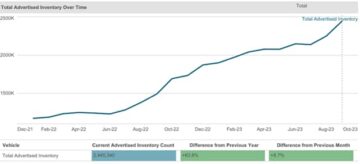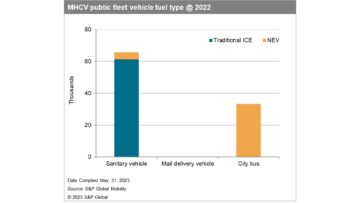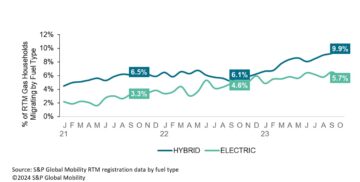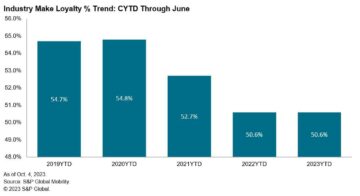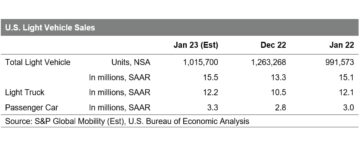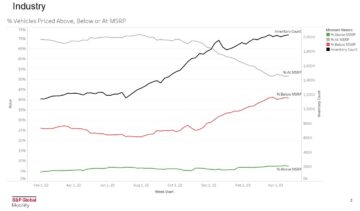
Aptiv’s decision to discontinue capital support for
Motional further accentuates the industry concerns around the
return on investment related to the commercialization of Level 4/5
robo-taxi business model.
Aptiv’s CEO, Kevin Clark, stated during the company’s
fourth-quarter earnings call that although Motional, its robo-taxi
venture with Hyundai Motor, continues to progress on its technology
roadmap, Aptiv is exploring alternatives to reduce its ownership
interest. “The costs related to delivering the tech principally, in
and around hardware, really makes it challenging from an adoption
standpoint in the mobility on-demand market,” Clark said.
Motional was established in 2020 as a 50:50 joint venture (JV)
focused on autonomous driving technology with each partner
investing $2 billion. Its roots trace back to nuTonomy, founded in
2013 by Karl Iagnemma and Emilio Frazzoli in Boston. NuTonomy
rapidly gained recognition for successfully testing autonomous
vehicle technology on public roads.
In 2017, Delphi acquired nuTonomy for a substantial $450
million. As Delphi later underwent a strategic split, its focus on
advanced electronic systems, safety technology, and autonomous
vehicle hardware and software crystallized into Aptiv. NuTonomy
seamlessly integrated into Aptiv.
Collaborating with Hyundai Motor, Motional unveiled plans to
co-develop production-ready autonomous versions of the Hyundai
Ioniq 5, earmarked for deployment in a robo-taxi service slated for
launch this year. The Hyundai Motor Group Innovation Center in
Singapore emerged as a pivotal hub for advancing this
initiative.
Motional’s geographical footprint extends across key cities
worldwide, including Boston, Pittsburgh, Las Vegas, Los Angeles and
Singapore, where rigorous testing regimes validate the robustness
and safety of its technology. Notably, Motional established
autonomous delivery services in partnership with Uber Eats in Los
Angeles. Motional also announced its plans during CES 2024 to
collaborate with Kia on developing next-generation vehicles primed
for commercial deployment later this decade.
Motional’s robo-taxi service ambition now depends on
Hyundai
Aptiv’s decision was positioned as a strategic maneuver rather
than a sign of skepticism toward Level 4 mobility-as-a-service
(MaaS) technologies, but it is impossible to fully separate the two
sentiments. From this perspective, Aptiv will be reallocating
resources to support its impressive near-term growth in advanced
driver assistance systems and automated driving of which it is a
conventional technology supplier. This shift bolsters the company’s
revenues while allowing Aptiv to mitigate the risk associated with
continued investment in a technology with uncertain
return-on-investment (ROI) timelines.
Another perspective speculates that Hyundai may choose to
continue funding and developing autonomous technologies, without
the involvement of Aptiv. One aspect supporting Hyundai’s potential
independent funding and development is the significant role of
original equipment manufacturers (OEM) in the mobility landscape.
OEMs serve as the primary point of contact and engagement with
customers, whether in traditional vehicle ownership or the emerging
market of autonomous MaaS similar to Uber or Didi. Given their
close relationship with consumers, OEMs have a vested interest in
advancing autonomous technologies to meet evolving consumer demands
for mobility solutions — and Hyundai has shown its desire to be
viewed as a high-tech brand active in new technologies.
Is there new competition within Hyundai Motor Group in
its 42dot acquisition?
Either way, with Aptiv stepping back, Hyundai-Kia Motor Group
will be considering the future of the Motional JV. It may choose to
shut down the JV entirely, which would imply a lack of certainty
surrounding the viability of Level 4 MaaS technologies — or at
least a markedly similar interpretation to Aptiv on ROI timelines.
The potential decision to close the JV could stem from various
factors, including bolstering its financial strength or realigning
its strategic priorities; however, it may simply need to focus on
other nearer-term challenges (such as the late-2023 delayed launch
of its Level 3 features).
However, the Level 3 delay brings another interesting angle.
Just three years after Aptiv acquired nuTonomy, Hyundai acquired
42dot in 2023 for $328 million with Hyundai and Kia holding stakes.
In November 2023, Hyundai postponed its launch of the Level 3
Highway Driving Pilot. Just a month later, Hyundai consolidated its
electronics, infotainment and autonomous driving efforts under
42dot in a push to advance its software-defined vehicle initiatives
in a software-focused reorganization.
The influence of startup 42dot will play a larger role within
Hyundai’s core business, starting with advancements in
electrical/electronic architectures, crucial for the redevelopment
of its Level 3 technology. This raises a question — will
Motional continue to influence Hyundai’s Level 4 ambitions, or will
42dot take on this responsibility? This does not necessarily
signify the end for Motional, as it could potentially be retained
as a US subsidiary (given the relatively high prospects for
robo-taxis) or as the consumer-facing mobility brand in the US
market. However, if Hyundai maintains its Level 4 ambitions, it
could lead to a significant shift in the organizational structure
and positioning of its product/expertise.
These alternative viewpoints highlight the complexity and
dynamism of the autonomous vehicle industry and the uncertainty of
the robo-taxi business model to operate sustainably and profitably.
This is causing stakeholders to weigh their long-term ambitions
against competing priorities, including short-term profitability as
well as midterm growth of core business units that should make
their future positions even stronger — presumably to be ready
if and when Level 4 MaaS is ready for prime time, provided there is
still market share to be captured.
Authors:
Jeremy Carlson – Associate Director, Autonomy, S&P Global
Mobility
Rohan Hazarika – Senior Research Analyst, Autonomy, S&P Global
Mobility
Learn more about our Autonomy
Forecasts
- SEO Powered Content & PR Distribution. Get Amplified Today.
- PlatoData.Network Vertical Generative Ai. Empower Yourself. Access Here.
- PlatoAiStream. Web3 Intelligence. Knowledge Amplified. Access Here.
- PlatoESG. Carbon, CleanTech, Energy, Environment, Solar, Waste Management. Access Here.
- PlatoHealth. Biotech and Clinical Trials Intelligence. Access Here.
- Source: http://www.spglobal.com/mobility/en/research-analysis/briefcase-the-robo-taxi-gamble.html
- :has
- :is
- :not
- :where
- ][p
- 2013
- 2017
- 2020
- 2023
- 2024
- 4
- 5
- 50
- a
- About
- accentuates
- acquired
- acquisition
- across
- active
- Adoption
- advance
- advanced
- advancements
- advancing
- After
- against
- Allowing
- also
- alternative
- alternatives
- Although
- ambition
- ambitions
- an
- analyst
- and
- Angeles
- angle
- announced
- Another
- aptiv
- architectures
- around
- AS
- aspect
- Assistance
- Associate
- associated
- At
- Automated
- automotive
- autonomous
- autonomous delivery
- autonomous vehicle
- Autonomy
- back
- BE
- Billion
- bolstering
- bolsters
- boston
- brand
- Brings
- business
- business model
- but
- by
- call
- capital
- captured
- Carlson
- causing
- Center
- ceo
- certainty
- Ces
- challenges
- challenging
- Choose
- Cities
- Close
- collaborate
- commercial
- commercialization
- company
- competing
- competition
- complexity
- components
- Concerns
- considering
- consumer
- Consumers
- contact
- continue
- continued
- continues
- conventional
- Core
- Costs
- could
- crucial
- Customers
- decade
- decision
- delay
- Delayed
- delivering
- delivery
- Delivery Services
- Delphi
- demands
- depends
- deployment
- desire
- developing
- Development
- didi
- Director
- does
- down
- driver
- driving
- during
- each
- Earnings
- earnings call
- efforts
- Electronic
- Electronics
- emerged
- emerging
- end
- engagement
- entirely
- equipment
- established
- Ether (ETH)
- Even
- evolving
- expert
- Exploring
- extended
- extends
- factors
- Features
- Featuring
- financial
- Focus
- focused
- Footprint
- For
- Founded
- from
- fully
- funding
- further
- future
- gained
- Gamble
- geographical
- given
- Global
- Group
- Growth
- Hardware
- Have
- High
- Highlight
- Highway
- holding
- However
- HTML
- HTTPS
- Hub
- Hyundai
- if
- imply
- impossible
- impressive
- improve
- in
- Including
- independent
- industry
- influence
- Initiative
- initiatives
- Innovation
- innovative
- insight
- insights
- integrated
- interest
- interesting
- interpretation
- into
- investing
- investment
- Investors
- involvement
- IT
- ITS
- joint
- joint venture
- jpg
- just
- JV
- karl
- Key
- Kia
- Lack
- landscape
- larger
- LAS
- Las Vegas
- later
- launch
- lead
- LEARN
- least
- Level
- level 4
- long-term
- los
- Los Angeles
- maintains
- make
- MAKES
- Manufacturers
- Market
- market share
- May..
- Meet
- Midterm
- million
- Mitigate
- mobility
- model
- Month
- more
- Motor
- necessarily
- Need
- New
- New technologies
- Newsletter
- next-generation
- notably
- November
- now
- of
- on
- On-Demand
- ONE
- operate
- opportunities
- or
- organizational
- original
- Other
- our
- ownership
- partner
- Partnership
- perspective
- pilot
- pittsburgh
- pivotal
- plans
- plato
- Plato Data Intelligence
- PlatoData
- Play
- Point
- positioned
- positioning
- positions
- potential
- potentially
- primary
- Prime
- profitability
- Progress
- prospects
- provided
- public
- Push
- question
- raises
- rapidly
- rather
- ready
- really
- recognition
- redevelopment
- reduce
- regimes
- related
- relationship
- relatively
- reorganization
- research
- Resources
- responsibility
- return
- revenues
- rigorous
- Risk
- roadmap
- roads
- robustness
- ROI
- Role
- roots
- s
- S&P
- S&P Global
- Safety
- Said
- seamlessly
- senior
- sentiments
- separate
- serve
- service
- Services
- Share
- shift
- short-term
- should
- shown
- shut
- Shut down
- sign
- significant
- signify
- similar
- simply
- Singapore
- Skepticism
- Software
- Solutions
- split
- stakeholders
- stakes
- standpoint
- Starting
- startup
- stated
- Stem
- stepping
- Still
- Strategic
- strength
- stronger
- structure
- subsidiary
- substantial
- Successfully
- such
- supplier
- support
- Supporting
- Surrounding
- sustainably
- Systems
- Take
- tech
- Technologies
- Technology
- Testing
- than
- that
- The
- The Future
- their
- There.
- this
- this year
- three
- time
- timelines
- to
- toward
- trace
- traditional
- two
- Uber
- Uber Eats
- Uncertain
- Uncertainty
- under
- underwent
- units
- unveiled
- us
- VALIDATE
- various
- VEGAS
- vehicle
- Vehicles
- venture
- versions
- viability
- viewed
- viewpoints
- was
- Way..
- weekly
- weigh
- WELL
- when
- whether
- which
- while
- will
- with
- within
- without
- worldwide
- would
- year
- years
- zephyrnet


